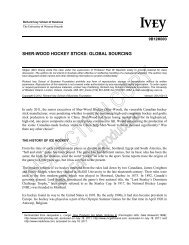foundation of canada asia pacific - Content Tagged with
foundation of canada asia pacific - Content Tagged with
foundation of canada asia pacific - Content Tagged with
Create successful ePaper yourself
Turn your PDF publications into a flip-book with our unique Google optimized e-Paper software.
cautioned that “not every Asian Canadian has the necessary business skills, knowledge<br />
and contacts to expand a company’s trade <strong>with</strong> the Asia-Pacific region.” The recent focus<br />
groups organized by the Foundation suggest that businesses are becoming interested in<br />
using Asian Canadians to develop Asian market contacts. However, some younger Asian<br />
Canadians, who generally have no more business connections than their non-Asian peers,<br />
worry that this quest for “Asian experts” may now be sidetracking their careers. The “hidden<br />
advantage” image is rebounding as a disadvantage for at least some Asian Canadians under<br />
the age <strong>of</strong> 40. At the same time, it is creating an unexpected career hurdle for non-Asian<br />
Canadian management graduates.<br />
Many Asians who emigrated to Canada after 1986, especially business visa holders from<br />
Hong Kong and Taiwan, brought <strong>with</strong> them skills from which they — and established<br />
Canadian businesses — have pr<strong>of</strong>ited. Some <strong>of</strong> these immigrants had business and social<br />
connections which they maintained after emigrating by travelling frequently between<br />
Canada and Asia. However, as time has passed, sources <strong>of</strong> immigration have changed and<br />
the proportion <strong>of</strong> business visa immigrants in the total has declined sharply. 5 Most<br />
importantly, a generation <strong>of</strong> Asian Canadians has grown up <strong>with</strong> little or no first-hand<br />
experience <strong>of</strong> Asia. These are the tens <strong>of</strong> thousands <strong>of</strong> high school, college and university<br />
graduates who may speak (but frequently not read) the Asian language <strong>of</strong> their parents,<br />
but otherwise have had the same experiences as their non-Asian classmates. Canadian<br />
society generally has not yet differentiated its second-generation Asian Canadians from<br />
their parents. One result is that mainstream Canadian business <strong>of</strong>ten assumes these young<br />
people have the same “hidden advantage” — the connections — as first-generation<br />
business immigrants.<br />
55<br />
Young Asian Canadians have had different experiences and hold a different outlook from<br />
first-generation immigrants. Most young Asian Canadians were either born or grew up in<br />
Canada. By birth or ethnicity they may be Asian, but by citizenship and social connections<br />
they are Canadian. They see themselves as embodying two cultures <strong>with</strong>out conflict though,<br />
depending on the context, they will sometimes identify <strong>with</strong> one more than the other.<br />
They can communicate <strong>with</strong> both mainstream and Asian cultures and see themselves as<br />
a bridge between the two — but a cultural, rather than a business, bridge. In contrast,<br />
first-generation Asian Canadians tend to cling to their Asian heritage and the way <strong>of</strong> life<br />
<strong>of</strong> their country <strong>of</strong> birth, even though it may have changed considerably since they left.<br />
They preserve their Asian heritage much more than the second generation because <strong>of</strong>ten<br />
they do not see themselves as bicultural. They do not feel fully integrated, nor see the<br />
need to be. Like many <strong>of</strong> the recent business migrants, they separate their ethnic from<br />
their civic identity. Most <strong>of</strong> them have grown up in an Asian business environment.<br />
Locally educated Asian Canadians appear to choose pr<strong>of</strong>essions outside the areas<br />
traditionally favoured in Asia — arts, literature, political science and law rather than<br />
science, medicine or accounting. In contrast to the generations before them or to recent<br />
business migrants, second-generation immigrants tend to have technical or pr<strong>of</strong>essional<br />
skills rather than the talents <strong>of</strong> the entrepreneur (perhaps a reflection <strong>of</strong> Canadian society<br />
generally). Many totally lack the “hidden advantage” <strong>of</strong> business connections. Their<br />
social connections may be largely <strong>with</strong>in the Asian-Canadian community, but these friends



